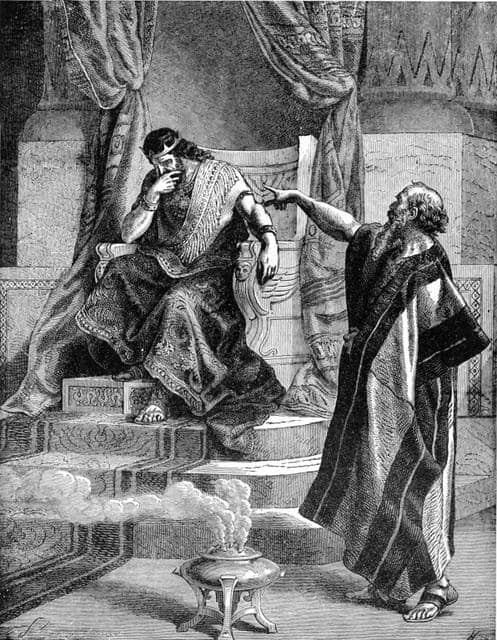13,576 total views
Homily for Friday of the 2nd Week of Lent, 1 March 2024, Mt 21:33-43, 45-46

Today’s Gospel reading reminds me of that story in the 2nd book of Samuel chapter 11 about the sin of David. Remember that passage about David having an affair with Bathsheba, the wife of his soldier Uriah? How he sent his soldier to the battlefield and had him positioned in the frontlines so that he would die in battle and David could take Bathsheba home as his wife? What was he thinking? That that was the end of the story? That nobody knew about it? Well, the story continues in chapter 12. There we are told how the prophet Nathan would drop by the palace for a casual visit and engage the King in a casual conversation. He would tell him a story about two men—one, a rich man who had flocks and herds of great numbers, and a poor farmer who had a little lamb, which he treasured as his only possession. The prophet would tell David how the rich man prepared a lamb as a meal for his visitor. And how, instead of taking from his own flocks and herds, he took the poor man’s little lamb, had it slaughtered and served at his table?
The author then tells us how King David reacted with rage at the prophet’s story and blurted out that that rich man was cruel and deserved to die. Then the prophet looked into his eyes and, pointing at him, said, “You are the man!”
In the Gospel, Jesus is also telling a story a landowner who entrusted his vineyard to his tenant farmers. He is addressing it as a parable to the chief priests and the elders of the people—the ones who would later have him crucified. He tells them how the tenant farmers not only refused to give the landowner his share of the harvest to the servants whom he had sent. How they seized his servants, beat them up and killed some of them. And how the landowner eventually decided to send his own son thinking they would respect him, how they also beat him up, dragged him out of the vineyard and killed him. Following the prophet Nathan’s style, Jesus shifts to an interactive mode and asks his audience, “What should be done to those cruel and wretched servants?” They answer in unison, “They should die!” The only difference here is, Jesus does not even say, “You are those tenants!” But at the end of the story, Matthew tells us they realized that “he was speaking about them.”
Have you ever attended Mass and, while listening to the homily, suddenly felt like God was addressing you personally and bringing you to a realization or a change of heart? The charismatics have a word for it—you feel “convicted”. There is a saying goes, “When you point an accusing finger at someone, do not forget that three others are pointing at you.” Perhaps, that is why Jesus said, “Do not judge and you will not be judged.” And “The measure with which you measure will be measured out to you.”
I think, of all Popes who have ever led the Roman Catholic Church, it’s Pope Francis who has brought across this same message most strongly especially to people who have a tendency to be judgmental towards others. People who are quick at labeling others, like those in irregular marital situations, as sinners. People who think of the Church as an exclusive company of the righteous. On many occasions, he has reminded people that the best antidote to the tendency to self-righteousness is the reminder that we are all sinners. There is one line in Psalm 130 that expresses this beautifully, the third verse which says, “If you O Lord should keep a record of all our sins, who can stand?”
















